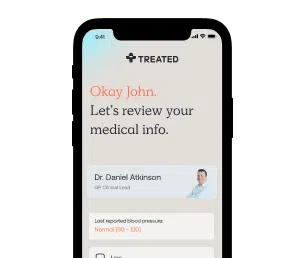Restless legs syndrome
Tablets and patches for unpleasant leg sensations.
Secure delivery
UK clinicians
Restless legs syndrome can range from an unpleasant nerve sensation to severe discomfort – causing the legs to ‘jump’, and stopping you from getting a good night’s sleep.
Order restless legs syndrome treatment online from Treated for fast and reliable relief.
Restless legs syndrome, sometimes known as Willis-Ekborn Disease, is a condition that affects your nervous system - resulting in a restless sensation in your legs, making you want to move them. Most people who have Restless Legs Syndrome experience symptoms in the evenings, when sitting or lying down, or when trying to get to sleep. There are things that you can do to make the symptoms better for a short time, but it’s important that you don’t confuse relief with resolution, and still get clinically approved treatment.
Whilst symptoms can range from mild to severe, the key complaint is that restless legs syndrome disrupts healthy, natural sleep. If the condition is because of other underlying health problems, poor sleep can make pre-existing issues worse.
Although restless legs syndrome can affect anyone, it’s more common in women and people entering middle age. It’s more common, for example, in women over forty than in men and children. There are a few potential causes of RLS: neurologists understand that it’s related to levels of a chemical called Dopamine in the body, because it controls our muscle movement. Restless legs syndrome could be a result of an iron deficiency, anemia, kidney failure or other existing medical conditions, such as diabetes and rheumatoid arthritis. It also affects one in five pregnant women, usually in their third trimester. Evidence also suggests that RLS is related to a dysfunction in one of the sections of the brain that controls movement (called the basal ganglia), which uses the brain chemical, dopamine.
Restless legs syndrome is quite common, the amount of people that have it worldwide is estimated to be between 3.9%-15% .

How we source info.
When we present you with stats, data, opinion or a consensus, we’ll tell you where this came from. And we’ll only present data as clinically reliable if it’s come from a reputable source, such as a state or government-funded health body, a peer-reviewed medical journal, or a recognised analytics or data body. Read more in our editorial policy.
Restless legs syndrome can be caused by a faulty gene, pre-existing medical conditions, various deficiencies, anemia, or by damage to the basal ganglia. The basal ganglia is the part of the brain that helps control your nervous system and motor functions; it relies on dopamine transmitters to send signals to various parts of your body. When dopamine receptors are damaged in the basal ganglia, signals become confused, and incorrect messages are sent down the spine and throughout your nervous system. This causes strange sensations, involuntary movements or spasms, and an overwhelming restless feeling. The lifestyle factors which can contribute to the development or severity of restless legs syndrome symptoms are: stress, poor sleeping patterns, smoking, and drinking alcohol. However these factors aren’t thought to cause restless legs syndrome.
As the name suggests, restless legs syndrome causes a feeling of restlessness in your legs. An overwhelming urge to move your legs, a tingling sensation, and physical jumping in your thighs, calves and feet. These symptoms can range from a slightly irritating tingling sensation, to an uncontrollable compulsion to move your legs, which can keep you up all night and cause stress and fatigue. Restless legs syndrome isn’t just related to the legs, either. Sometimes the symptoms of restless legs syndrome can be found in your arms as well.
While there is no medical evidence to suggest that restless legs syndrome can cause more serious health concerns, it can and will have a detrimental effect on your overall lifestyle and health, because it can cause sleep deprivation. Without healthy, natural sleep, all health conditions can worsen. If you develop restless legs syndrome earlier in life, you’re more likely to experience worsening symptoms over time, so it’s important to find the best treatment for you.

How we source info.
When we present you with stats, data, opinion or a consensus, we’ll tell you where this came from. And we’ll only present data as clinically reliable if it’s come from a reputable source, such as a state or government-funded health body, a peer-reviewed medical journal, or a recognised analytics or data body. Read more in our editorial policy.

How we source info.
When we present you with stats, data, opinion or a consensus, we’ll tell you where this came from. And we’ll only present data as clinically reliable if it’s come from a reputable source, such as a state or government-funded health body, a peer-reviewed medical journal, or a recognised analytics or data body. Read more in our editorial policy.
Have something specific you want to know? Search our info below, or ask our experts a question if you can’t find what you’re looking for.
Allen, R., et al. Restless legs syndrome/Willis-Ekbom disease diagnostic criteria: updated International Restless Legs Syndrome Study Group (IRLSSG) consensus criteria--history, rationale, description, and significance, 2014. Sleep medicine, 15(8), 860–873.
Ohayon, M.M., O’Hara, R. and Vitiello, M.V., 2012. Epidemiology of restless legs syndrome: A synthesis of the literature. Sleep Medicine Reviews, 16(4), pp.283–295.
Role of Dopamine Receptor Agonists in the Treatment of Restless Legs Syndrome. CNS Drugs, 18(1), pp.27–36.

Generic tablet that's available as a low dose or maintenance dose for relief from symptoms.

A patch that gives you 24 hour protection from restless legs syndrome.

Nightly tablets for restless legs. Sleep easier, live happier.

Registered with GMC (No. 4624794)
Meet Daniel
Registered with GPhC (No. 2202465)
Meet Sanjeda
Registered with GPhC (No. 2070724)
Meet Craig
Always read the leaflet that comes with your medication and tell us about any side effects you get.
We know health, but you know you.
Our experts tell you what’s safe, but you decide what’s best.
Answer a few questions and tell us about yourself. Get tailored advice from our clinicians so you can choose better.

Choose your treatment and how often you have it delivered.

We know things change. It’s the nature of life. We’ll check in regularly to make sure your treatment is still right for you.
Pause. Change. Skip. Start again. Any time you like.
Here are some other things we can help with.
Choose from our range of tablets and solutions. Get ongoing care and support from our experts.
Stop smoking treatments that can help you kick the habit forever, and reduce your risk of disease.
Tablets or injections. Tailored weight loss treatments combined with ongoing support from our experts.
We're making healthcare more about you. Sign up to our newsletter for personalised health articles that make a difference.
Disclaimer: The information provided on this page is not a substitute for professional medical advice, diagnosis, or treatment. If you have any questions or concerns about your health, please talk to a doctor.
We couldn't find what you're looking for.
Here's everything we treat. Or, if you're looking for something we don't have yet, you can suggest something.
If there’s a particular treatment or condition you’re looking for, tell us and we’ll look into it for you.
Submit your question here, or tell us if you’ve found an issue on our site.
We’ll get back to you very soon. We aim to respond to all queries in one working day.
You’re signed up to our newsletter. Keep an eye on your inbox for our latest update.
By clicking 'Subscribe now' you're agreeing to our Privacy Policy.
We’ve sent you an email asking you to confirm your email address.